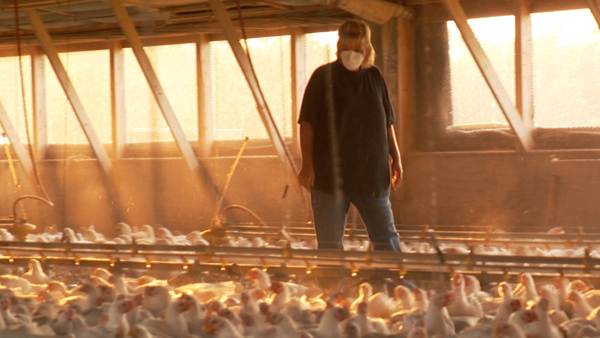Movie review by Greg Carlson
“Food, Inc.” is the best of a group of movies focused on issues and problems related to the corporatization of the food industry in America and beyond, even as the documentary opts for breadth over depth on a topic as huge as the ever-expanding waistlines of our population. In recent years, movies including “Super Size Me,” “Fast Food Nation,” and “King Corn” have all tackled various aspects of the way we eat, but “Food, Inc.” summarizes many familiar themes in a compelling admonition that raises many important ethical, moral, and fiscal questions about diet and nutrition and the hazards of unchecked big business.
Director Robert Kenner loads his double-barreled shotgun with journalists Eric Schlosser (“Fast Food Nation”) and Michael Pollan (“The Omnivore’s Dilemma”), who appear on camera to explain several of the central arguments of their popular books. Included among the observations is the unsettling idea that the highly industrialized system of American mass food production has changed radically in the post WW 2-era, and can be blamed for increases in contamination as well as a decline in the quality and nutritional value of practically everything we consume.
Critics of the movie’s anti-big business acumen have claimed that “Food, Inc.” is hurtful to the American farmer, citing the 2007 USDA Structure and Finances of U.S. Farms statistic that 98 percent of farms are owned by families and not corporations. This charge misses the mark, however, as Virginia farmer Joel Salatin (whose Polyface Farm was featured in “The Omnivore’s Dilemma”) is depicted as the closest thing to a hero in the movie. Salatin, with charm and humor, delivers folksy, commonsense advice on responsible and sustainable livestock management. Along with Gary Hirshberg of organic yogurt company Stonyfield Farm, Salatin represents an alternative to the heavily criticized models of the mega-corporations.
The movie’s section on seed company and agribusiness titan Monsanto is frustrating and frightening, spinning an Orwellian vision of domination so complete that the mind boggles at a culture that supports the residual effects of gene patenting. Like Tyson, Smithfield, and Perdue, Monsanto declined filmmaker invitations to appear on camera, but the company was vexed enough to include a section on its website (www.monsanto.com/foodinc/) devoted to the refutation of charges made in “Food, Inc.” In a bulleted list, Monsanto engages in bizarre spin, stating that the movie “demonizes American farmers,” even though the film does no such thing. Perhaps Monsanto equates “American farmers” with industrial food producers.
No matter where one’s beliefs fall along the political spectrum, it is difficult not to be moved by the story of food safety advocate Barbara Kowalcyk, whose two-year-old son Kevin died after eating burgers tainted with E. coli bacteria. Kowalcyk’s tenacious activism, which takes her to the offices of politicians in Washington, demonstrates the underlying optimism of the film – which sometimes lives in the shadows of the stomach turning imagery of slaughterhouses and the dispiriting scenes in which illegal workers are arrested even though the companies that knowingly hire and exploit them face no consequences for their actions. “Food, Inc.” covers so many topics, it might just as easily have been made into a series of episodes for a show like “Frontline.” Even so, it is compelling and necessary viewing.
